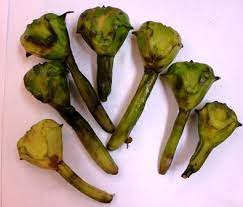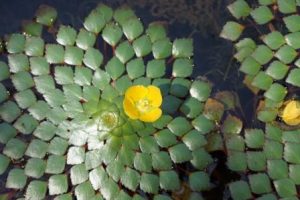BOTANICAL NAME: Trapa bispinosa
FAMILY: Trapaceae
CLASSICAL CLASSIFICATION-
Bhavaprakasha nighantu – Amradiphala varga
ENGLISH NAME: Water chest nut
COMMON NAME:
Hindi: Singhara, Singhada
Bengali: Paniphal, Singade, Jalfal
Kannad: Singade, Gara, Simgara, Simgoda


REFERENCE: BHAVAPRAKASH SAMHITA with link e Nighantu:
https://niimh.nic.in/ebooks/e-Nighantu/bhavaprakashanighantu/?mod=read
|
HABITAT: It is a floating herb, found in swamps and slow rivers in full sun and low-energy, nutrient-rich fresh waters. It is distributed all over the tropical, sub-tropical and temperate zone of Asia, Africa and Southern Europe.
.
BOTANICAL DESCRIPTION: It is an aquatic herb which often grows in water around 60 cm deep. The submersed leaves are alternate, finely divided, and can grow up to 15 cm long. The floating leaves are arranged in a rosette, much larger and coarsely toothed. They are rhomboid in shape, 2–6.5 cm in diameter, dark green above and reddish purple beneath, broader than long, with entire base, apex acute red. Flowers are few, axillary, solitary and whitish yellow in color. Fruits are obovoid, angular, with a spreading flattened very sharp spinous horn at either side. The fruits develops underwater.
AYURVEDIC CHARACTERISTICS:
| RASA | GUNA | VEERYA | VIPAKA | PRABHAVA | DOSHGHNTA |
| Madhura, Kshaya | Guru, Rūkşa, | Sheeta | Madhura | Pittashamaka |
AYURVEDIC ENERGETICS:
| TASTE | PROPERTY | POTENCY | POST DIGESTIVE EFFECT | EFFECT ACTION | DOSHA ACTION |
| Sweet, Astringent | Heavy,
Dry |
Cold | Sweet | Pacifying pitta dosha |
MAJOR CHEMICAL CONSTITUENTS:
The flour of the dried fruit is rich in proteins and minerals. It contains phosphorus, sulfur,
Calcium, sodium, magnesium, iron and potassium. The starch isolated from the flour
contains 15% amylose and 85% amylopectin. Apart from these citric acid, tannins, proteins are also found in the plant.
THERAPEUTIC USES:
- Diarrhoea – Prepare halwa of 30 to 50gm of shringataka flour and use it orally.
- Intestinal ulcer – Take 10 gm flour with one glass Cow milk twice a day for 2 weeks.
- Eczema – Dried singhara should be mixed with lemon juice and applied regularly on the affected area
INDICATIONS:
Vrishya aphrodisiac, Daha Buring senation, Trishna Thirst, Grahi Absorbent Raktapitta Bleeding disorders, Atisara Diarrhoea, Shrama Fatigue, Shopha Inflammation and swelling
USEFUL PART: Fruit
DOSAGE: Powder: 5 to 10gm
AYURVEDIC FORMULATION:
- Puga Khanda
- Saubhagya Sunthi
- Amritprasha Ghrita
